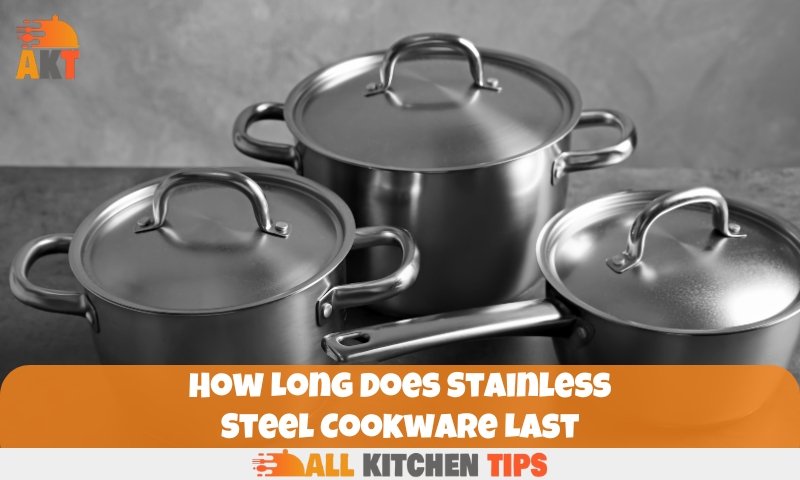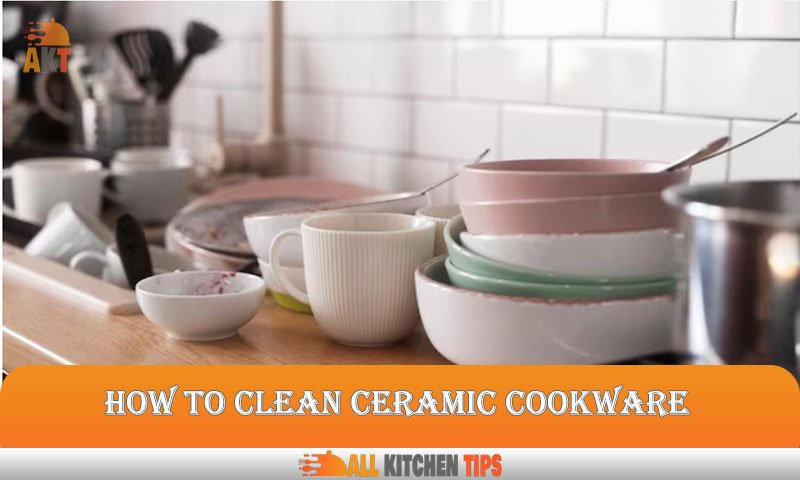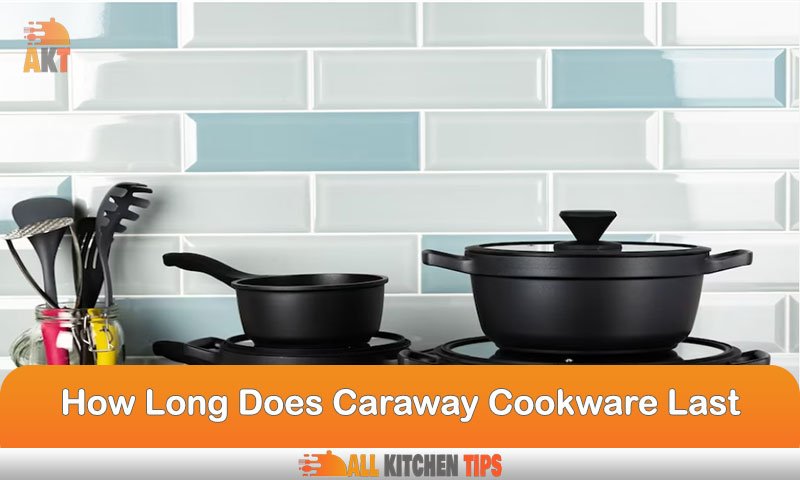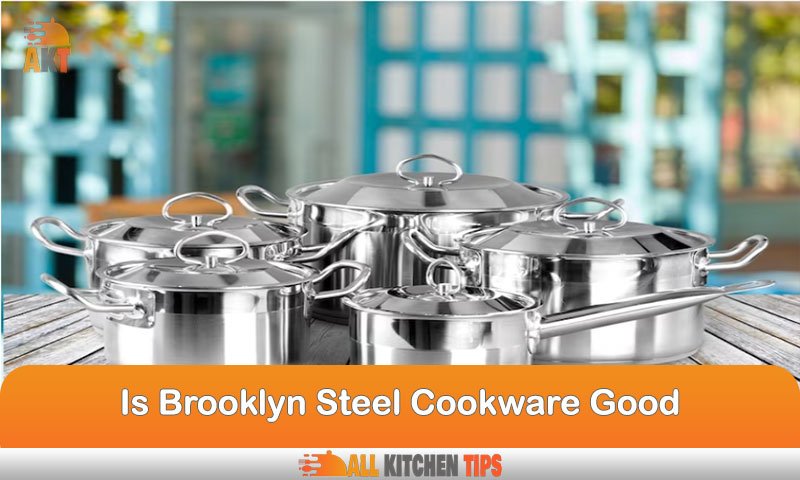Stainless steel cookware can last for decades if properly maintained, making it a durable and worthwhile investment for your kitchen. Stainless steel cookware is an essential part of any modern kitchen.
The high-quality material is known for its durability, longevity, and corrosion-resistant properties that allow it to withstand high heat and harsh environments. However, as with any product, the lifespan of stainless steel cookware depends on how well it’s maintained. Proper cleaning methods, avoiding harsh chemicals and metal utensils, and keeping the cookware dry and free of moisture can help extend its lifespan.
In this article, we’ll discuss how long stainless steel cookware can last and the factors that can affect its lifespan.
Understanding Stainless Steel Cookware

Stainless steel cookware is a favorite in many households because of its durability, non-reactive nature, and sleek look. Despite being relatively expensive, it is an investment worth making since it lasts longer than other cookware types if well-cared for. In this section, we will delve into the unique characteristics of stainless steel cookware, its different grades, and the benefits of using it as your primary cookware set.
Characteristics Of Stainless Steel Cookware
Stainless steel cookware is made of a mixture of metals, including iron, chromium, and nickel, which give it its unique properties. Some of the characteristics that make it stand out include:
- Non-reactive: Stainless steel doesn’t react with acidic foods like aluminum or copper, making it safe for cooking acidic dishes like tomato sauce.
- Durable: Stainless steel is known for its durability and resilience to scratches and dents.
- Retains heat: The material is an excellent heat conductor, which enables it to retain heat for an extended period.
- Easy maintenance: With stainless steel, you don’t have to worry about the cleaning process, as it is dishwasher-safe and easy to clean.
Different Grades Of Stainless Steel
Stainless steel is graded based on its composition, with the most common grades being 18/8 and 18/10. The numbers represent the percentages of chromium and nickel in the material, respectively. Other grades include 18/0, which has no nickel, and 13/0, which is magnetic.
- 18/8: Also known as type 304, it contains 18% chromium and 8% nickel and is the most commonly used grade. It is resistant to rust, corrosion, and staining.
- 18/10: Type 316, also referred to as marine-grade stainless steel contains 18% chromium and 10% nickel. This grade is even more resistant to rust and corrosion.
- 18/0: This grade does not contain nickel and is therefore magnetic. It is an affordable option but is more susceptible to rust and stains than the other grades.
Benefits Of Using Stainless Steel Cookware
Switching to stainless steel cookware can be a game-changer in your kitchen. Here are some advantages of using stainless steel cookware:
- Retains heat: Stainless steel is an excellent conductor of heat, allowing your food to cook evenly.
- Long-lasting: With proper care, stainless steel can last a lifetime, making it an excellent investment for your kitchen.
- Easy to clean: Unlike cast iron or copper cookware, stainless steel is dishwasher-safe and easy to clean.
- Versatile: You can use stainless steel cookware for different cooking methods, including stir-frying, sautéing, boiling, and baking.
Understanding stainless steel cookware’s unique characteristics, different grades, and benefits is crucial to making an informed purchase decision. Invest in a good quality set, and with proper care, you will enjoy your stainless steel cookware for many years to come.
Factors Affecting Stainless Steel Cookware’s Lifespan

Stainless steel cookware is a popular choice among many for its durability and sleek appearance. Nevertheless, a number of factors can have an impact on the lifespan of stainless steel cookware. Here are the main factors that affect the lifespan of stainless steel cookware:
Exposure To High Temperatures
Cooking at high temperatures can significantly shorten the lifespan of stainless steel cookware. When subjected to high heat, the metal expands, leading to warping and deforming. Additionally, prolonged exposure to high temperatures can cause stainless steel to lose its hardness and corrosion resistance.
Therefore, it’s crucial to avoid cooking at overly high temperatures, especially with stainless steel cookware.
- Avoid cooking on high heat to prevent warping and deforming.
- Prolonged exposure to high temperatures can cause stainless steel to lose hardness and corrosion resistance.
Frequency Of Use And Cleaning
Using stainless steel cookware frequently and cleaning it often can positively or negatively impact its lifespan. Frequent use and cleaning with the wrong methods can lead to corrosion, scratches, and pitting, reducing its durability. However, proper care of stainless steel cookware through cleaning and maintenance can prolong its lifespan and maintain its gleaming appearance.
- Frequent use and cleaning with the wrong methods can cause corrosion, scratches, and pitting.
- Proper care, cleaning, and maintenance can prolong the lifespan of stainless steel cookware.
Type Of Cooking Surface
The type of cooking surface can affect how long stainless steel cookware lasts. Cooking on rough surfaces or placing it in harsh environments can cause scratches and dents, leading to corrosion and shortening its lifespan. In contrast, cooking on smooth surfaces prolongs the lifespan of stainless steel cookware.
- Cooking on rough surfaces and in harsh environments causes scratches, dents, and ultimately corrosion.
- Cooking on smooth surfaces prolongs the lifespan of stainless steel cookware.
Quality Of Manufacturing
The quality of manufacturing of stainless steel cookware can impact its durability and lifespan. Cookware made with cheap or inferior-quality stainless steel may not last long and can corrode easily. Therefore, it’s important to invest in high-quality stainless steel cookware for longevity.
- Cookware made with poor-quality stainless steel corrodes easily and doesn’t last long.
- Investing in high-quality stainless steel cookware is essential for longevity.
The lifespan of stainless steel cookware is dependent on several factors, including exposure to high temperatures, frequency of use and cleaning, type of cooking surface, and quality of manufacturing. Implementing proper care, cleaning, and maintenance can prolong its lifespan and maintain its sleek look.
Remember, investing in high-quality stainless steel cookware is always a wise choice for durability.
How To Extend The Lifespan Of Stainless Steel Cookware
Stainless steel cookware is a popular choice for its durability and resistance to scratches, rust, and stains. However, this doesn’t mean that it will last forever. To maximize the lifespan of your stainless steel cookware, here are some tips to follow:
Proper Cleaning And Maintenance Techniques
To ensure that your stainless steel cookware remains in excellent condition, proper cleaning and maintenance are crucial. Here are some essential techniques to keep in mind:
- Wash your stainless steel cookware thoroughly with warm, soapy water after each use.
- Avoid using abrasive cleaners or steel wool, as they can scratch the surface of the stainless steel cookware.
- Use a non-abrasive sponge or cloth to clean your cookware.
- If you notice any burned-on food, soak the cookware in warm, soapy water before scrubbing it to remove the residue.
- Dry your stainless steel cookware with a soft towel or a dishcloth after washing to prevent water spots.
Storage And Organization
To extend the lifespan of your stainless steel cookware, proper storage, and organization are essential. Here are some tips for storing your cookware:
- Store your stainless steel cookware in a cool, dry place to prevent humidity and moisture from corroding the surface.
- Avoid stacking your cookware, as this can cause scratches and damage to the surface.
- If you must stack your cookware, place a soft cloth or paper towel between them to protect the surface.
- Hang your pots and pans on a pot rack or hooks to save space and avoid stacking them.
Tips For Cooking With Stainless Steel
Cooking with stainless steel can be challenging, especially if you’re used to non-stick cookware. Here are some tips to ensure that your food doesn’t stick to the surface:
- Heat your stainless steel cookware on low to medium heat to prevent hot spots, which can cause food to stick to the surface.
- Preheat your cookware for a few minutes before adding your ingredients.
- Add some oil or butter to the surface before adding your food to prevent sticking.
- Avoid overcrowding your cookware, as this can prevent proper browning and cause food to stick to the surface.
Understanding When It’s Time To Replace Your Cookware
No matter how well you maintain your stainless steel cookware, there will come a time when it needs to be replaced. Here are some signs to look out for:
- Scratches and dents that can’t be removed.
- Deep stains or discoloration that can’t be removed.
- Warping or bulging of the cookware.
- Loose or wobbly handles that can’t be tightened.
- Holes or cracks in the surface.
By following these tips, you can ensure that your stainless steel cookware lasts for years to come. Remember to clean and maintain it properly, store it correctly, and replace it when necessary.
FAQs
How Long Does Stainless Steel Cookware Last On Average?
Stainless steel cookware can last for decades, provided it’s well-maintained and used correctly.
Can You Repair Damaged Stainless Steel Cookware?
Yes, it is possible to repair dents, scratches, or warping in stainless steel cookware through professional repair.
What Are The Benefits Of Using Stainless Steel Cookware?
Stainless steel cookware is durable, non-reactive, easy to clean, and safe to use with acidic foods.
Conclusion
After reading this article, you now have a better understanding of how long stainless steel cookware lasts and how to extend its lifespan. With proper care, stainless steel cookware can last for a very long time and continue to function effectively.
It is crucial to keep in mind that factors like the cookware’s quality, how frequently it is used, and how it is cleaned and stored can all affect how long your cookware lasts. To get the most out of your stainless steel cookware, avoid using abrasive materials during cleaning and store it properly.
Keep in mind that even the highest quality cookware will start showing signs of wear and tear after many years of use. So, if you notice any faults or structural damage in your cookware, it’s time to replace it. By following these tips, your stainless steel cookware will serve you perfectly for many years to come.





